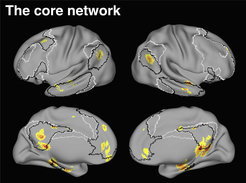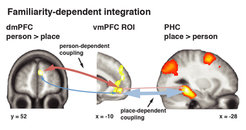Former Max Planck Research Group Adaptive Memory
Humans possess the remarkable capacity to vividly remember a plethora of experiences from their lives. They can voluntarily reminisce about cherished moments but also be haunted by intrusive memories of unpleasant experiences. At the heart of the research in the Adaptive Memory Group is the insight that memory is not merely a passive capacity but a constructive process. As such, memories, on one hand, are malleable to change and disruption but, on the other hand, can also be recombined into novel experiences. We seek to understand the nature of adaptive memory by using behavioral, fMRI, and neuromodulation methods, and by examining cognitive functions in patients with focal brain lesions. In particular, we focus on three intertwined research areas:
(i) Memory suppression

The work on voluntary forgetting seeks to understand the different neurocognitive mechanisms underlying the ability to suppress unwanted memories. We have reported evidence for two opposing mechanisms that can achieve memory suppression (Benoit & Anderson, 2012): one by effectively shutting down hippocampal retrieval processes (i.e., direct suppression) and the other by guiding hippocampal retrieval towards the recollection of alternative memories that then keep the unwanted memory out of awareness (i.e., thought substitution). I examine how these mechanisms can be adaptively recruited to purge intrusive memories from consciousness (Benoit et al., 2015), and how they are compromised in clinical populations that are characterized by deficits in controlling unwanted thoughts (Stramaccia et al., 2021; Kupper, Benoit, et al., 2014). We further examine how a mechanism akin to direct suppression can also be engaged to control persistent imaginings of future fears (Benoit, Davies, & Anderson, 2016) (see also ii).
Key publications:
(ii) Episodic simulation

The work on episodic simulation examines the core brain network involved in recollecting the past and imagining the future (Benoit & Schacter, 2015), with an emphasis on the medial prefrontal cortex and the hippocampus (Benoit, Szpunar, & Schacter, 2014). It seeks to elucidate the mechanisms by which imagining the future can bias decisions towards more farsighted outcomes (Benoit, Gilbert, & Burgess, 2011; Rösch, Stramaccia, & Benoit, 2022). In recent work, we have also provided evidence that we learn from merely simulated experiences much in the same way as we do from actual experiences (Benoit, Paulus, & Schacter, 2019, Paulus et al., 2022). Episodic simulations thus shape our real-life attitudes and models of the world. However, despite the clear adaptive value of envisaging the future, dwelling too much on prospective events can also make us apprehensive. We examine how, in such situations, the mechanisms involved in memory suppression can also help us control our fears of the future (Benoit, Davies, & Anderson, 2016; see also i).
Key publications:
(iii) Prefrontal cortex functioning

This work focuses on the memory functions of the medial prefrontal cortex (PFC). We have provided evidence that this region codes for affective representations of our environment (e.g., of familiar people and places) that can be flexibly engaged for the simulation of possible future events (Benoit et al., 2011; 2014; 2019; Paulus et al., 2020). We currently seek to understand the interactions of this region with the medial temporal lobes, both in the service of retrieving individual episodic memories and for the formation of affective memory schemas. In addition, our research on suppression adds to our understanding of the lateral PFC by showing how its subregions influence processing in other parts of the brain, notably the hippocampus (Benoit & Anderson, 2012; Benoit et al., 2015). Further research is targeted at determining the functional organization of rostral prefrontal cortex, i.e., the most anterior part of the brain (e.g., Benoit, et al., 2010; 2012).
Key publications (in addition to those listed above):


